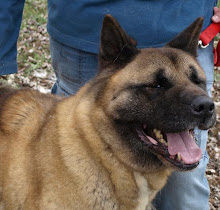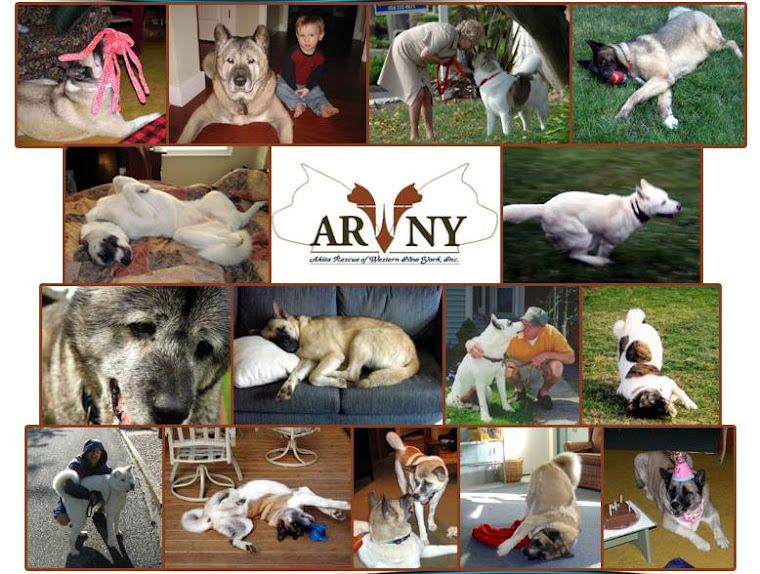
This is a picture of an Akita with a disease known as VKH-like Syndrome or UDS. Uveodermatoglogical Syndrome (UDS) is an immune-mediated canine disease characterized by inflammation of the eye, depigmentation of skin and whitening of hair. Morbidity is related primarily to the eye inflammation, which can result in secondary ophthalmologicl disorders that lead to blindness.
UDS is similar to the human Vogt-Koyanagi-Haradi Syndrome, (VKH) which is characterized by uveitis (inflammation of the eye), poliosis (whitening of hair), vitiligo (depigmentation of skin) and a variety of neurological symptoms. Unlike VKH, however, UDS does not normally present with neurological symptoms. This disease is known to be more common in Northern Breeds such as Akias, Sibes and Samoyeds.
UDS is similar to the human Vogt-Koyanagi-Haradi Syndrome, (VKH) which is characterized by uveitis (inflammation of the eye), poliosis (whitening of hair), vitiligo (depigmentation of skin) and a variety of neurological symptoms. Unlike VKH, however, UDS does not normally present with neurological symptoms. This disease is known to be more common in Northern Breeds such as Akias, Sibes and Samoyeds.
Because the eye disease has the serious outcome of blindness in most cases and the skin disease is secondary (but serious also), focus is usually on the eye disease. As with other autoimmune diseases, the primary goal of therapy is to suppress the body's immune response with large (potentially dangerous) doses of systemic glucocorticosteriods such as prednisone. To prevent blindness, on-going immune suppression is needed and more potent drugs like Cytoxan, Azathioprine or Imuran are used if steroids fail. Continued topical treatment is also needed, usually with steroid-containing eye drops or steroid injections. Controlling eye pain may also be required. In cases where vitiligo has occurred, protecting the affected areas of skin with sunblocks may be needed to prevent the sunburn and squamous cell carcinoma that may follow.
Prognosis is poor overall. Even vigorous therapy may not control the situation. The biggest worry is the damage to the body that the treatment may cause. We in Akitas already know the dangers of overuse of prednisone and its dangers to our breed's temperament in addition to the dangers it poses to the Akita's body. In addition, UDS Akitas suffer as a result of this disease with infections on their skin, in their eyes, etc. Is it fair to allow them to suffer just to keep them alive for our own desire?
This poor Akita above came to ARWNY in this horrid condition, suffering from it his whole life. His sire had it and yet was used in a breeding program. Then his son, this poor boy above, followed suit -- being bred despite this pain, this suffering he was living with. Any puppies he has produced are now all at risk for this horrid disease.
Please recognize diseases like this before allowing them to get to this point -- because no dog deserves to suffer as this poor Akita has his whole short life -- with interdigital cysts that were infected and oozing pus, with skin infections throughout his chest and entire head, with blindness, with inflammation of his eyes causing him severe pain. Please do NOT breed affected Akitas carrying diseases like this and if you know of Akitas being bred that do carry diseases like this, please please be brave enough to report them to the Akita Club of America or to any local Akita Club or Dog Club that the "breeder" may belong to, or at the very least, try to convince the "breeder" to not continue the breeding program. The future of our breed depends on healthy Akitas with good temperaments being the ones bred; and anyone that owns one, breeds one, shows one or knows of one is equally needed to do the right thing for the future of Akitas.




What a shame that someone would think that such an animal should be bred.
ReplyDeleteThis is timely for us. My Caboo's thyroid screen came back normal, so we're going in to the vet this week to get a tiny skin biopsy and try to learn if he has sebaceous adenitis, yet another heritable condition that Akitas sometimes get.
What an immense responsibility it is to be a breeder - so many things to watch out for. It makes me respect even more the handful of people I know who are breeding dogs whose beauty, health and temperments are a credit to all their breeds can be.